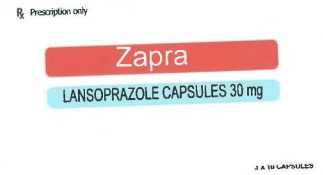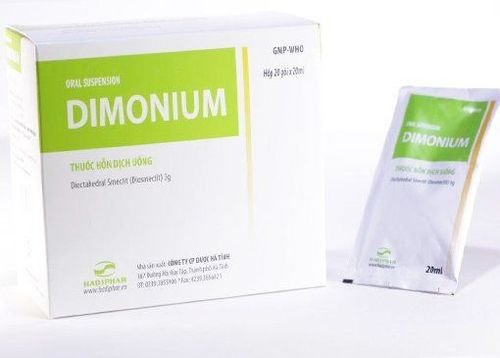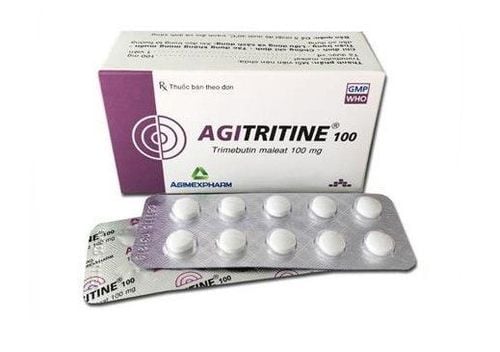This is an automatically translated article.
Rabefresh is a medication that reduces stomach acid. It is used in the treatment of digestive disorders such as peptic ulcer disease, gastroesophageal reflux disease, and Zollinger-Ellison syndrome.1. What are the effects of Rabefresh?
Rabefresh 20 has the main ingredient Rabeprazol sodium with a content of 20mg. Rabefresh belongs to the group of gastrointestinal drugs and is prescribed by doctors to treat a number of gastrointestinal diseases including:
Symptomatic treatment related to duodenal ulcer (a sore in the first part of the small intestine) ) and includes ulcers caused by the bacteria H. pylori. Rabeprazole is used in adults only to treat conditions associated with excessive amounts of stomach acid, such as Zollinger-Ellison syndrome. Rabeprazole is also used to heal duodenal ulcers or erosive esophagitis (damage to the esophagus caused by stomach acid). Rabeprazole is used short-term in the treatment of symptoms of gastroesophageal reflux disease (GERD) in adults and children over 1 year of age. Treatment of stomatitis and reflux esophagitis. Mechanism of action:
The main ingredient Rabeprazole works to block the production of acid in the stomach. The drug relieves symptoms and prevents damage to the esophagus - stomach in patients with gastroesophageal reflux disease (GERD). Rabeprazole is also useful in reducing stomach acid in patients with Zollinger-Ellison syndrome.
2. Dosage and usage
Usage : Rabefresh drug is prepared in the form of soluble tablets and used orally. If you are taking Rabefresh to treat duodenal ulcers, take it after meals. If taking medicine to prevent ulcers caused by Helicobacter pylori bacteria, it should be taken with food.
Note: Swallow Rabefresh tablets whole and do not crush, chew or break the tablet.
Dosage:
In the treatment of gastroesophageal reflux disease (GERD): Dosage for adults (from 18 years of age): Use 20mg x 1 time / day. Dosage for children (from 12 to 17 years old): Use 20mg x 1 time / day, use time for up to 8 weeks. Note: Safety and efficacy have not been established for the treatment of GERD in children younger than 12 years of age. Therefore, the drug should not be used with this object. Dosage for duodenal ulcer: Dosage for adults (aged 18 years and older): Dose: 20 mg x 1 time / day after breakfast for up to 4 weeks. Dosage for ulcers caused by Helicobacter pylori Dosage for adults (18 years and older): A dose of 20mg twice daily with breakfast and dinner for 7 days is used in combination with Amoxicillin and Clarithromycin. . Pediatric Dose (ages 0 - 17 years): Safety and effectiveness have not been established for the treatment of duodenal ulcers caused by H. pylori bacteria in people younger than 18 years of age. Therefore, it is necessary to consult a doctor before taking the drug. Dosage for treatment of Zollinger-Ellison syndrome: Dosage for adults (from 18 years of age): Initial dose is 60mg x 1 time / day. The maximum dose is 100mg x 1 time / day or 60mg x 2 times / day. When it is necessary to increase the dose of the drug, the patient should consult the doctor. Overdose and treatment:
Manifestations of overdose: When overdosing on the drug, the patient may experience symptoms such as tachycardia, headache, blurred vision, abdominal pain (stomach area), nausea or vomiting. vomiting and drowsiness. Treatment: Treat with the symptoms that the patient experiences. In case the patient overdoses and experiences severe reactions, they should immediately seek medical assistance. Contraindications:
Do not use Rabefresh for patients with an allergic reaction to the ingredient Rabeprazol sodium or hypersensitivity to the drug component. Do not take Rabefresh with Rilpivirine - a drug used to treat HIV infection .
3. Side effects
Common side effects during taking Rabefresh such as sore throat, headache, nausea, vomiting, flatulence, diarrhea and constipation. Rare side effects include rash, flu-like symptoms, and infections (including the gastrointestinal pathogen Clostridium difficile). Some serious side effects of the drug include: Severe stomach pain, watery or bloody diarrhea. Sudden pain or difficulty moving the hip, wrist, or back, and seizures. kidney problems such as fever, rash, nausea, loss of appetite, joint pain, urinating less than usual, blood in the urine, swelling, and rapid weight gain. An increase in new or worsening lupus symptoms with joint pain and skin rashes on the cheeks or arms when the body is exposed to sunlight. Decreased magnesium levels cause dizziness, fast or irregular heartbeat, tremors, jerking muscle movements, restlessness, muscle cramps, muscle spasms in the hands and feet, coughing, choking and shortness of breath. Long-term use of rabeprazole may increase your risk of developing stomach tumors called adenomas. If experiencing these symptoms, the patient should stop using Rabefresh and notify the doctor for appropriate treatment.
4. Caution
Rabeprazole can cause problems affecting kidney function. Tell your doctor if you are urinating less than usual or if you notice blood in your urine. Diarrhea can be a sign of a new infection. Call the doctor if the patient has diarrhea with loose or bloody stools. Use of proton pump inhibitors that contain rabeprazole sodium may increase the risk of Salmonella and Campylobacter infections. Hypokalemia can occur with prolonged use, leading to side effects such as tetanus, arrhythmias or convulsions. Increased risk of bone fractures with long-term use of Rabeprazole. Before taking this medicine, tell your doctor if you have ever had liver disease, osteoporosis or low bone mineral density, lupus (an autoimmune disorder) and low blood magnesium levels. Kidney or liver problems: In people with kidney or liver problems that are unlikely to affect the metabolism of Rabeprazole or its half-life, including those on hemodialysis, Cirrhosis. Therefore, the patient can still use the drug like a normal person. Rabeprazole may affect the results of certain medical tests. Therefore, tell your doctor that you are taking Rabeprazole. Take the medicine for the full prescribed length of time, even if your symptoms have improved. Tell your doctor if your symptoms do not improve or if your condition gets worse after using Rabeprazole. Pregnancy: Studies in pregnant animals have shown no risk to the fetus. However, this information cannot confirm whether the drug affects women during pregnancy or not. Rabefresh should only be used if the potential benefits outweigh the potential risks. Lactation: Rabeprazole can pass into breast milk and may cause side effects in a nursing infant. Therefore, before taking the drug, the patient should consult the doctor. For children: Rabeprazole tablets can be used in children 12 years of age and older to treat GERD for up to 8 weeks.
5. Drug interactions
Drug interactions occur when one or more drugs are combined and change the way they work. This may cause adverse reactions or make the medicine less effective. Rabefresh may interact with other medications, vitamins or herbs that you are taking. Therefore, patients need to tell their doctor all the products they are taking recently to avoid drug interactions.
HIV medicines such as Atazanavir, Nelfinavir or Rilpivirine: Using these with Rabeprazole reduces the concentration of these drugs in your body leading to a decrease in their effectiveness. Saquinavir: Using Saquinavir with Rabeprazole can increase the body's levels of this medicine and possibly increase unwanted side effects. Warfarin: Increased side effects may include higher INR (blood test results). This can cause abnormal bleeding. Cyclosporine: In combination with Rabefresh 20, patients may need to monitor blood levels of cyclosporin. Methotrexate: May increase side effects due to high levels of methotrexate in the body. Digoxin : May increase side effects due to high levels of digoxin in the body Antifungals such as Ketoconazole and Itraconazole: Patients may need to stop treatment with Rabeprazole while taking these medicines to make sure they are working properly. Cancer drugs such as erlotinib, dasatinib, and nilotinib: You need to monitor your body's response to these drugs to make sure they're working properly. Abemaciclib: Rabeprazole may decrease the rate of excretion of Abemaciclib, which may result in higher serum concentrations than Albendazole: The metabolism of Albendazole may be reduced when combined with Rabeprazole. Alendronic acid: The therapeutic efficacy of Alendronic acid may be reduced when used in combination with Rabeprazole. Methotrexate: Concomitant use of a proton pump inhibitor with methotrexate at high doses may increase and prolong serum concentrations and lead to methotrexate toxicity. Above is all information about Rabefresh, patients need to carefully read the instructions for use, consult a doctor / pharmacist before using. Note, Rabefresh is a prescription drug, patients absolutely must not buy and treat at home because they may experience unwanted side effects.













